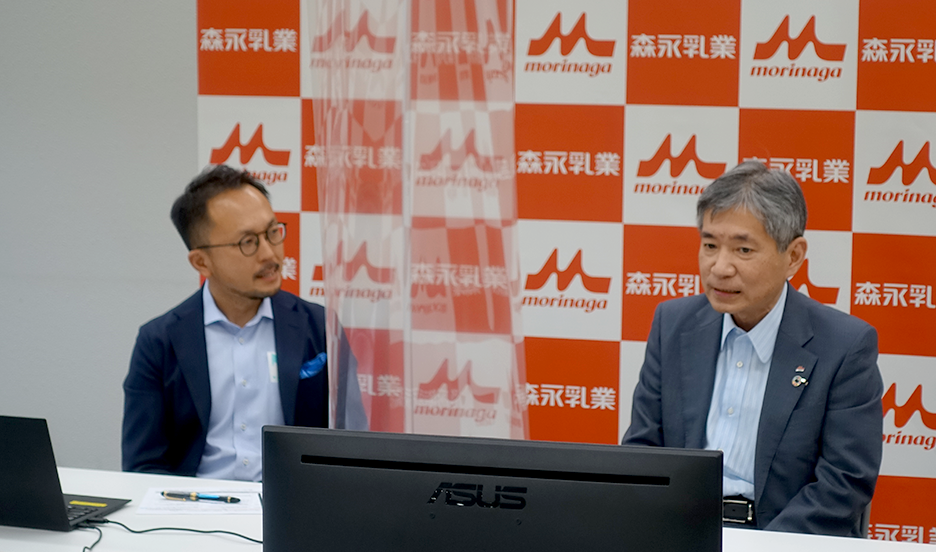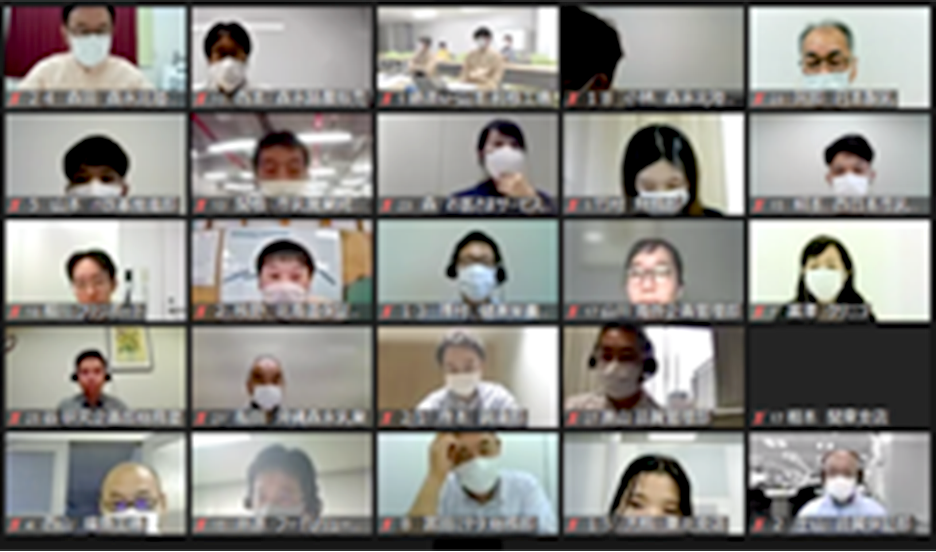Sustainability Management Promotion System
To achieve sustainability management, the Morinaga Milk Group is aiming to resolve social issues through its businesses based on the approach that it is crucial that all employees make sustainability initiatives a matter of personal responsibility.
We are taking a two-pronged approach to tackle issues from a long-term perspective—we formed the Sustainability Committee as the driving system toward promoting efforts of the Sustainability Medium- to Long-Term Plan 2030, which sets 2030 as the target year to achieve common objectives of the Group; and we are making sustainability a personal responsibility through sustainability activities at business sites that applies to workplaces at all sites around Japan.
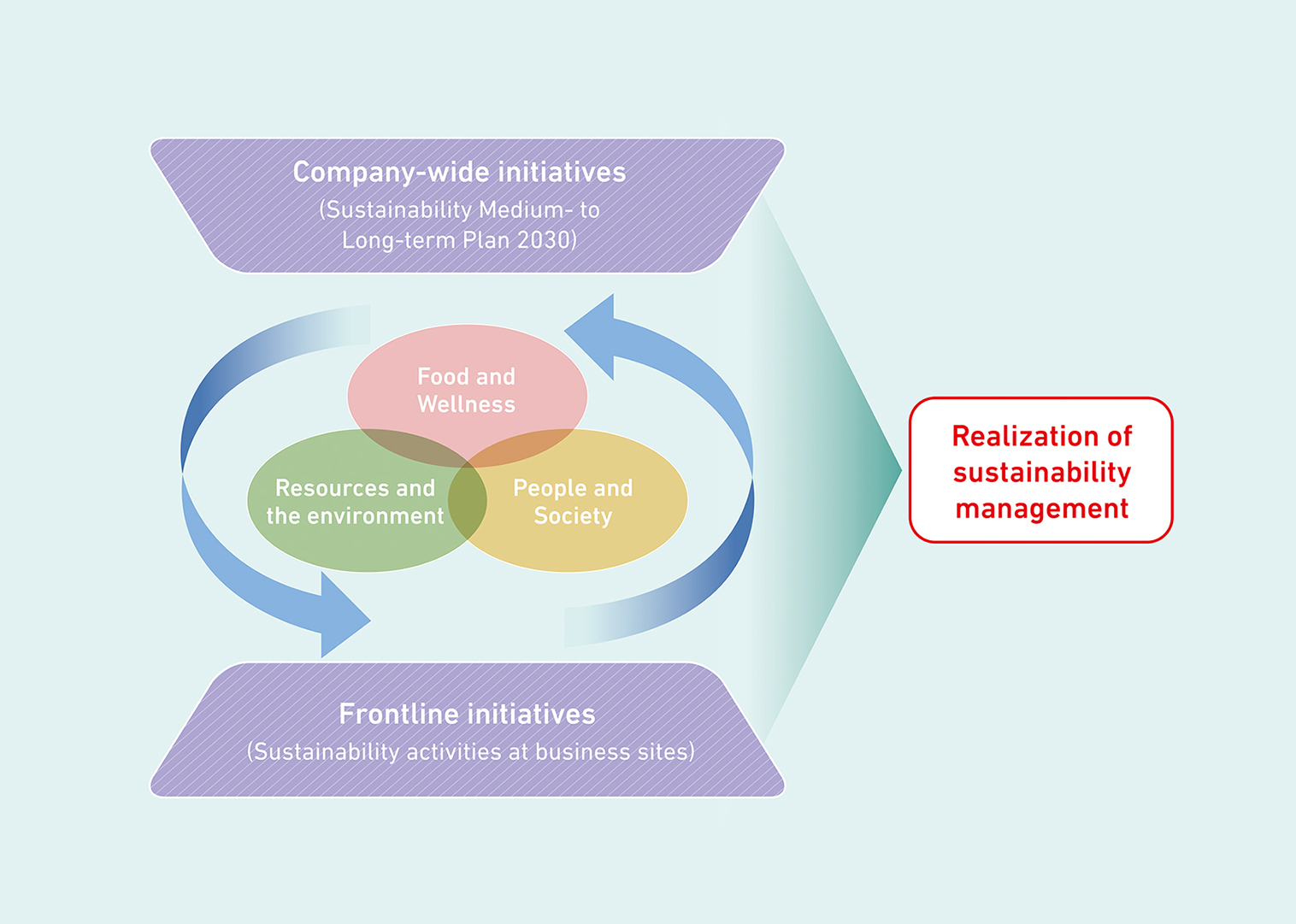
Sustainability Committee
The president serves as committee chair, the head of the Sustainability Division serves as the vice-chair, internal directors and division managers serve as committee members, and the Sustainability Promotion Department acts as secretariat. In addition to regular committee meetings held every six months, the Climate Change Subcommittee, Plastics Subcommittee, and other subcommittees have been established.
The committee has formulated a roadmap aimed at the integration of business and sustainability activities, in order to resolve social issues through our products, services, and activities while growing sustainably with society. Based on this roadmap, we undertake and manage activities, and hold discussions.
The content of discussions is reported to the Board of Directors.
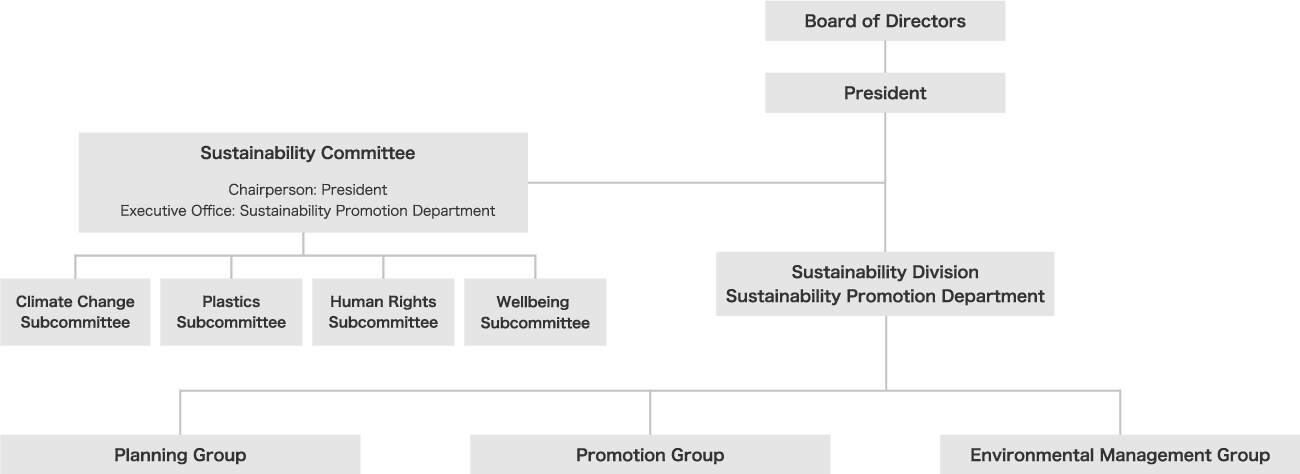
Matters to be discussed and content of discussions
Matters to be discussed
- Proposals for our management policies from a sustainability perspective
- Ideals aimed at achieving our Corporate Philosophy and 10-Year Vision
- Response to sustainability-related environmental and social issues surrounding our company
- Progress reports on Priority Issues
- Progress reports and topics from subcommittees
- Monitoring of the effectiveness of policies
- Content of communication with stakeholders
- Environmental- and social issue-related partnerships with industry groups and other companies in the industry
- Construction and development of an in-house promotion system for sustainability management
Content of recent discussions
First discussion in FY 2023 (April 2023)
- Progress report on Sustainability Medium- to Long-Term Plan 2030 for the previous fiscal year
- ESG third party evaluation
- Measures to address climate change
- Initiatives for plastics
- Human rights issues
- Sustainability activities at business sites
- Sustainability activities at global business sites
Second discussion in FY 2022 (October 2022)
- Status of promoting sustainability management (sustainability education, disseminating information, etc.)
- April to September progress report on Sustainability Medium- to Long-Term Plan 2030
- Measures to address climate change
- Initiatives for plastics
- Human rights issues
- Sustainability activities at business sites
- Investors' meetings related to sustainability and ESG
First discussion in fiscal 2022 (April 2022)
- Final report on ESG performance toward Previous Medium-term Management Plan
- The Medium- to Long-Term Sustainability Plan starting in April 2022
- ESG briefing sessions
- Climate Change measures
- Plastic measures
- Human rights issues
Sustainability activities at business sites
The Group is focusing efforts on sustainability activities at business sites with the aim of making sustainability the personal responsibility of all employees through coexistence with local communities as well as communication and contribution with stakeholders.
Sustainability Promotion Leaders
In 2021, we appointed Sustainability Promotion Leaders at 80 business sites of domestic Group companies to help promote sustainability activities at those sites.
Under the supervision of heads of sites responsible for promoting activities, these Promotion Leaders set and implement various topics related to sustainability activities at their own business sites.
Sustainability Forum
The Sustainability Forum is held twice a year to provide the opportunity for Promotion Leaders around Japan to get together and impart their knowledge on promoting activities with one another for the benefit of all.
Sustainability Awards
A Sustainability Awards category was also created in the Morinaga Milk Awards internal awards systems held once a year.
Sustainability Awards recognize independent efforts exerted by business sites for contributing to local communities or environmental conservation, with selected sustainability activities lauded company wide as positive examples and shared with other sites.
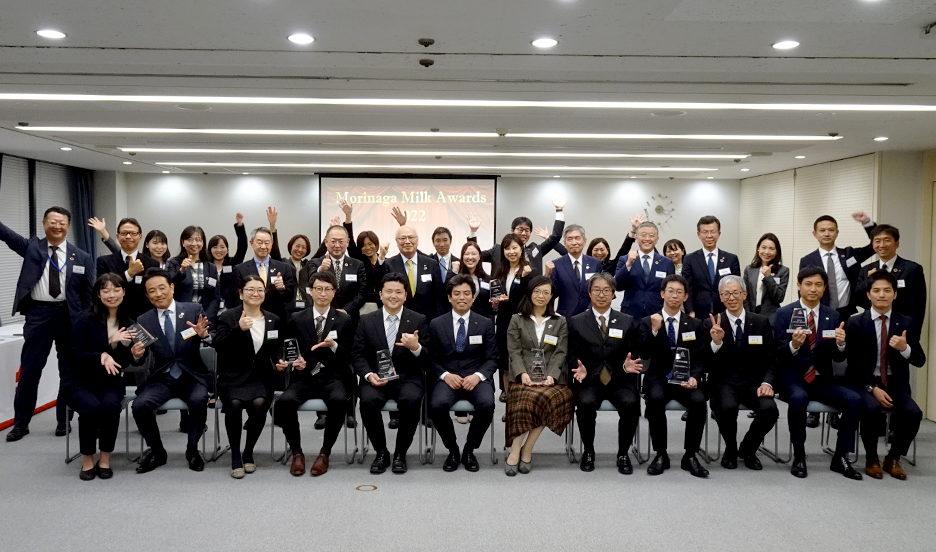
Sustainability education for employees
To ensure that everyone at the Morinaga Milk Group makes sustainability their own personal responsibility, educational courses are provided at all Group companies to help foster understanding of sustainability, SDGs and the Sustainability Medium- to Long-Term Plan 2030.
Video content and e-Learning is provided to all Group employees, with 96.4% taking e-Learning courses in FY 2022.
Participatory workshops for employees and study sessions are also held at business sites in Japan to help foster understanding of Sustainability Medium- to Long-Term Plan 2030. In FY 2022, study sessions were held at 58 out of 80 domestic business sites, and at two sites overseas.
Sustainability Promotion Department
The committee is composed of the Planning Group, the Promotion Group, and the Environmental Management Group. The responsibilities of each group are as follows.
Planning Group
Planning and drafting of the Medium- to Long-Term Sustainability Plan, operations for the Sustainability Committee, disseminating sustainability information inside and outside the company, and planning, implementing and promoting measures to improve the corporate culture and organizational climate
Promotion Group
Providing support for sustainability activities at production sites and promoting plant tours, childcare consultations, food education, etc.
Environmental Management Group
Planning and promotion of company-wide environmental measures, general planning for environmental strategies, and operation and management of the ISO 14001 environmental management system
Methods for Identifying Priority Issues
Through analysis of the risks and opportunities facing management and business, and through evaluation of priorities from the perspective of stakeholders, we identified issues (materiality) that should be given priority. We will continue to regularly review and revise these Priority Issues to meet changes in the environment.

Targets
In our Medium- to Long-Term Sustainability Plan that begins in FY 2022 and ends in 2030, we set action targets centered on the Seven Priority Issues.
See the Data Book for sustainability targets and achievements in the previous Business Plan for the Next Medium Term.
| Priority Issues | KPI | FY 2022 Performance |
FY 2024 Intermediate Target |
FY 2030 Target |
|
|---|---|---|---|---|---|
| Food and Wellness | Contribution to Wellness | Net sales of products with consideration for health issues (compared to FY 2021) ※1 ※3 | 1.1-fold | 1.2-fold | 1.7-fold |
| Increase in the number of published research papers on health and nutrition (including patent applications) |
Number of published research papers: 47
|
||||
| Participants in health promotion and nutrition education activities (FY 2021 to FY 2030) ※3 |
FY 2022: Approximately 106,000 Cumulative total: 165,000 |
Total 350,000 | Total 1,000,000 | ||
| Increase our image as a company that contribute to health (Corporate brand image survey ※2) | 17.9% | - | 25% | ||
| Food safety and reliability | Acquisition of FSSC22000 and other GFSI certification standards at all group manufacturing sites ※3 |
93% *Acquisition rate at the domestic manufacturing sites: 100% |
Maintenance/strengthening of certification at all domestic manufacturing sites | Acquisition/maintenance of certification at all Group manufacturing sites | |
| Enhancement of traceability mechanisms that ensure safety and reliability which customers expect | Promoted systematization of traceability | ||||
| Continuation of zero quality-related incidents and initiatives to ensure compliance with laws and regulations |
|
||||
| Resources and the Environment | Mitigation of and adaptation to climate change | Scope 1 + 2 CO₂ emissions reduction rate (compared to FY 2013) |
23% | 23% or higher | 38% or higher |
| Scope 3 GHG emissions reduction rate (compared to FY 2020) |
10% | 3% or higher | 10% or higher | ||
| Percentage of sites formulating BCPs to address climate change ※3 | Scheduled to be disclosed in FY 2023 | 100% | |||
| Environmental consideration and resource recycling | ISO14001 certification maintenance rate at domestic manufacturing sites | 96% certification acquisition rate at the domestic manufacturing sites | Completion of certification acquisition at domestic manufacturing sites | 100% | |
| Petroleum-derived virgin plastic usage reduction rate (compared to FY 2013) |
22.9% | 10% or higher | 25% or higher | ||
| Industrial waste recycling rate (zero emissions) |
99.3% | 99% | Achievement of zero emissions | ||
| Water resource usage reduction rate | 14.1% | 11% or higher | 15% or higher | ||
| Maintain and improve water quality of wastewater | Conducted periodical inspections of wastewater treatment facilities at manufacturing sites to maintain appropriate wastewater treatment, and increased the capacity of facilities to address production increase | ||||
| Rate of accommodation of environmentally friendly design in major brands | Scheduled to be disclosed in FY 2023 | - | 100% | ||
| Sustainable raw material procurement | Rate of transition to RSPO mass balance certification | 22.8% | 80% |
100% |
|
| Usage ratio of FSC-certified or other environmentally friendly paper | 30.4% | 100% | - | ||
| Expansion of support for raw material suppliers | Introduced “MO-Lagoon for Dairy,” a manure processing system for dairy at the Nasu Gakuroku Dairy Farm | ||||
| People and Society | Respect for human rights and diversity | Compliance with our Human Rights Policy throughout the supply chain |
|
Human rights due diligence execution and measures; construction of continuity system | Continuous compliance |
| Ratio of Female Managers | 5.8% | 6% or higher | 10% or higher | ||
| Childcare leave usage ratio (men) | 90.5% | - | 100% | ||
| Turnover for elderly care | 1 people | 0 people | |||
| Number of major work-related accidents | 0% | 0 (continued) | |||
| Amount of investment in human resource development | ¥31,000/person/year | - | ¥40,000/person/year | ||
| Coexistence with local communities | Total number of participants in community activities at business sites ※3 |
FY 2022: 5,927 Cumulative total: 9,559 |
37,000 | 100,000 (from FY 2021) | |
| Ratio of Group business sites carrying out community activities ※3 | 100% in Japan | 100% in Japan | 100% in Group | ||
*1 Products listed in "Topics: Product design with consideration for health issues"
*2 Morinaga Milk Industry's own consumer survey. "Health contribution image" is 15% in FY 2021.


